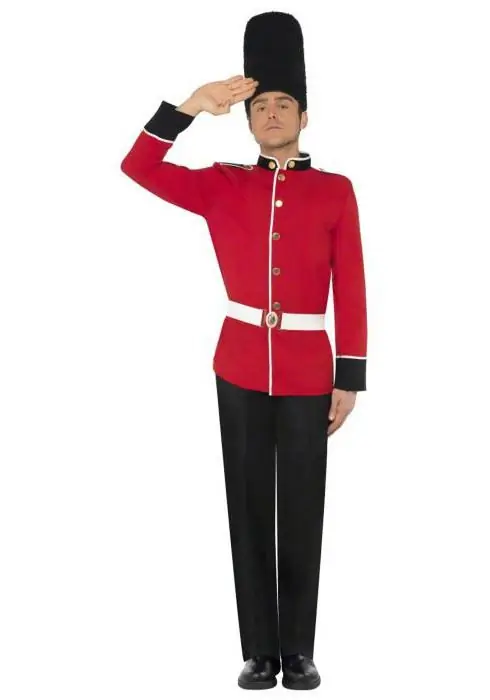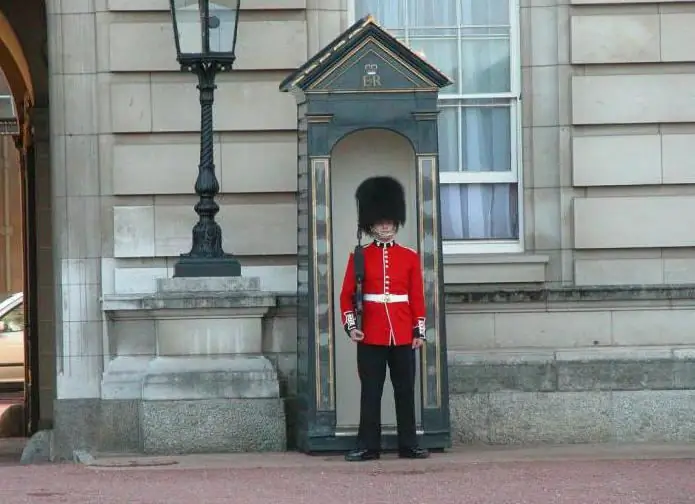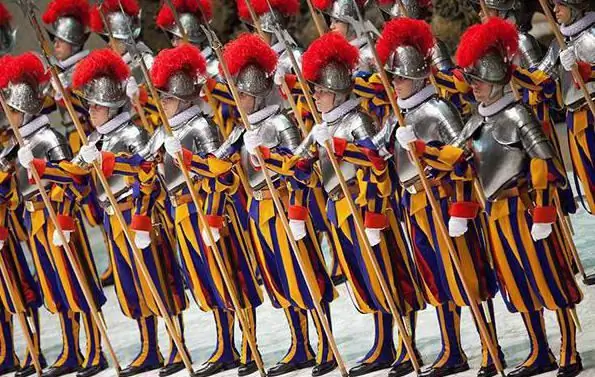Night, honorary, enhanced, solemn, round-the-clock, on foot … So you can list indefinitely. But will it help to understand what a guard is? More likely no than yes. Therefore, it is better to seek help from numerous dictionaries…

Direct meaning
What is a guard? First of all, this is the word. Morphological analysis suggests that, as a noun, it differs in the following features: common noun, inanimate, masculine, second declension. In addition, this lexical unit has not one, but several meanings. Like other polysemantic words, "guard" has both direct and figurative meaning. Let's deal with the first one. Our main assistants in this matter will be the following reference publications: “The Explanatory Dictionary of the Living Great Russian Language”, edited by V. Dal, “The New Dictionary of the Russian Language. Explanatory and derivational ", edited by Efremova T. F. and" Explanatory Dictionary of the Russian Language ", authors Ozhegov S. I., Shvedova N. Yu.
So, to the question of what a guard is, these linguists answer unambiguously with minor amendments: guards, a group of armed people,assigned to protect something or someone. In the meaning of “guard”, “guard” is used in such combinations as “garrison guard”, “guard of honor”, “change guard”, “set guard” and others.

Secondary values
The meaning of a word that arose on the basis of the original one is called figurative. We open the dictionary and find what the guard is under the number "two" - the duties of the guard, duty, condition. In the meaning of “post”, “guard” is used in the following expressions: “take someone under guard”, “carry guard”, “stand on guard”.
However, there is also a meaning under the number "three" - the location of the guards. Alexander Sergeevich Pushkin has lines on this topic: “It freezes beautifully at the parade, and goes on guard to warm up.” In the lexeme we are interested in, transfers of the name from one object to another occurred on the basis of similarity, i.e. metaphorical transfer, and adjacency - metonymic figurative meaning.
Cry for help
Russian writer Sergei Lukyanenko, our contemporary, says this kind of phrase: “There is a kind of dark freedom that frees a person, first of all, from himself, from his conscience. If you feel emptiness inside and any absence of pain, shout "guard", although it will be too late … ". What kind of cry is this? It turns out that in all dictionaries there is also a meaning at number "four" - an exclamation, a desperate cry calling for help. This is what the famous prose writer had in mind.

Origin
Lexeme "guards" (meaningwords follow) - is not native Russian. It is borrowed from the Turkic and Mongolian languages, which are essentially close relatives. The Russian linguist Sergei Anatolyevich Starostin argues that the Mongolian language should be considered the starting point, although reverse borrowing is also possible. In other words, at first the Mongolian lexeme "karau", "kara" (to look) passed into the Turkic "kara" (to look), and then it was transformed into "karaul" (watch) and again crossed the border to the Mongols in the same form.
The Turkic lexical units "karak" - eye, "karala, karys, karai" - to keep an eye on, to look closely, to observe, to take care, undoubtedly, had their influence on the further transformation of the word. The given data are taken from the publication "Indo-European Etymological Dictionary", created on the basis of the research of Starostin S. A. "The Tower of Babel".
Synonym for the word "guard"
According to the above, the studied lexical unit is a multi-valued unit of the language. Therefore, for each value there are synonyms. Before listing them, you need to remember what a synonym is.
In linguistics, the science of language, it is customary to understand synonyms as words that mostly refer to the same part of speech, have similar meanings, but differ in spelling and sound. For example, kindness - humanity, complacency, gentleness; castle - palace, fortress.
What is a synonym for the word "guard" in the sense of "an armed unit posted to protect someone or something"? There are several of them: security,guard, patrol, Custodia. Synonyms for the analyzed word in a figurative sense - "exclamation, call for help" - are such lexemes as "shout, help, save, sos". Another reference publication helped to find this kind of information - "Dictionary of Russian Synonyms" by N. Abramov, containing more than three hundred thousand words and expressions.
Stable expressions
The analysis of the lexeme "karauli" (see the meaning of the word above) will be considered incomplete if you do not look at such a linguistic phenomenon as phraseology. Indeed, there are many phraseological turns, which include the considered lexical unit. Among them, the most interesting and frequently used are the expressions “at least shout the guard”, “keep the guard” and “guard board”. They have all the main features of phraseology, namely: stability, integrity of the combination of two or more components, as well as the presence of a single meaning that is in no way connected with the meaning of each word included in it.

The above examples of phrases are holistic, stable and have the same meanings: “at least shout the guard” - a difficult, hopeless situation, “keep guard” - guard something, sit on the clock, “guard board” - an outdated turnover, associated with the watchman's duty to beat her with a mallet.

Catchword
Speaking of the guard, one cannot fail to mention one popular expression - "The guard is tired!". Its authorship is attributed to the sailor Zheleznyak, who activelyparticipated in the dispersal of the Constituent Assembly in January 1918. According to historical data, in the early morning the sailor entered the spacious, brightly lit hall of the palace where the meeting was held, walked past numerous rows, boldly climbed the podium and firmly asked the speaker and all those present to stop the meeting, arguing that the guard was supposedly tired. This statement was answered with a refusal, shouting and violently indignant. But Zheleznyak continued the pressure, arguing that the workers do not need any chatter, and again repeated his historical phrase: "The guard is tired!" Since then, it has been firmly entrenched in the phraseological dictionary as a phrase-symbol of an armed uprising.

Official terminology
And now it's time to turn to encyclopedias, namely, to the world-famous encyclopedic dictionary of Brockhaus and Efron, the Great Soviet Encyclopedia and the Military Encyclopedia. When asked what guard, guard is, they already reveal the essence of the term.
In the days of tsarist Russia, the guards in the army were corporal, non-commissioned officers and officers. Today, there are other units in the Russian army. First of all, this is an internal or ship guard, which is engaged in the protection of objects inside a military camp or a ship.
There is also a garrison guard. This is a temporary formation, called for the defense of garrison facilities. In addition, there are visiting, temporary and honor guards. The first and second are organized to protect military cargo or convicts during theirtransportation, i.e. outside the territory of the military unit. And, finally, the last type is a company formed to protect historical sites, objects of national importance, to meet honored guests from foreign countries and to give military honors.






